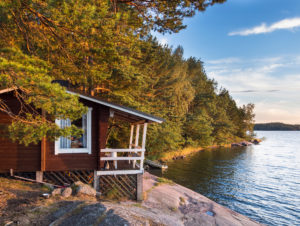Michigan Summer Resort Lawyers Representing Summer Resort Associations
HOA Law
Practice Areas
Summer Resort Associations
Attorneys
Practice Areas
HOA Attorneys Serving All Of Michigan
Michigan Summer Resort Lawyers Representing Summer Resort Associations
In addition to traditional homeowners associations, Michigan also recognizes a unique type of homeowners association called a “Summer Resort Association.” These are established under one of the following five statutes:
- Act 230 of 1897, Summer Resort and Park Associations, MCL 455.1, et seq.;
- Act 39 of 1889, Summer Resort and Assembly Associations, MCL 455.51, et seq.;
- Act 69 of 1887, Suburban Homestead, Villa Park, and Summer Resort Associations, MCL 455.101, et seq.;
- Act 137 of 1929, Incorporation of Summer Resort Owners, MCL 455.201, et seq.; or
- Act 161 of 1911, Parks, Playgrounds, Drives, and Boulevards, MCL 455.301, et seq.
Unlike condominium associations, which are governed under the Michigan Condominium Act, Summer Resort Associations are governed by their respective Summer Resort Act and the Michigan Business Corporation Act, MCL 450.1101, et seq. Summer Resort Associations were first created over 100 years ago and were governed by a set of complicated and unique rules that are often different than a typical homeowners association.
What is the Michigan Summer Resort and Assemblies Act?
 The Michigan Summer Resort and Assemblies Act was established in 1889 as an act to authorize the formation of corporations for the purchase and improvement of grounds to be occupied for summer homes, for camp-meetings, for meetings of assemblies or associations and societies organized for intellectual and scientific culture and the promotion of the cause of religion and morality, or any or all of such purposes; and to impose certain duties on the department of commerce.
The Michigan Summer Resort and Assemblies Act was established in 1889 as an act to authorize the formation of corporations for the purchase and improvement of grounds to be occupied for summer homes, for camp-meetings, for meetings of assemblies or associations and societies organized for intellectual and scientific culture and the promotion of the cause of religion and morality, or any or all of such purposes; and to impose certain duties on the department of commerce.
What are the basic principles that govern a Summer Resort Association?
In Michigan, a summer resort association is defined by a few basic characteristics.
- First, a Michigan Summer Resort is an organization that is responsible for managing and maintaining real property. In some instances, the summer resort association is responsible for managing common areas and in other cases it is also responsible all the land, including the land on which the cottages are situated.
- Second, a Michigan Summer Resort is composed of members, and in almost all cases, the members must have some form of ownership interest in the real property that is governed by the association. It is also typical for a summer resort owner to receive a stock certificate that is representative of their interest in the summer resort association, along with a real property interest.
- Third, summer resort associations are governed by contractual agreements between the association and its members. In most cases, the contractual agreements impose restrictions on how the members may use real property and provide a framework for governing the community association. A summer resort association’s primary responsibility is to enforce the restrictions and abide by the procedures in the governing documents to preserve property values and protect the health, safety, and welfare of the membership.
- Fourth, summer resort associations almost always involve a financial component, in which the members have an obligation to contribute financially toward the management and maintenance of the real property governed by the community association. In most cases, a summer resort association has the right to secure payment by placing and foreclosing liens if a member does not satisfy their financial obligations.
Do members of summer resorts have to pay dues?
 The board of trustees of a summer resort owners corporation has authority to enact bylaws for purposes subject to repeal or modification by the members at any regular or special meeting. Assessments are determined based on the bylaws, but also subject to the specific act in which that association was organized under. The specific assessments are as followed:
The board of trustees of a summer resort owners corporation has authority to enact bylaws for purposes subject to repeal or modification by the members at any regular or special meeting. Assessments are determined based on the bylaws, but also subject to the specific act in which that association was organized under. The specific assessments are as followed:
455.16 Annual dues; levy, use, payment.
Sec. 16.
It shall be lawful for the board of directors to provide for annual dues to be levied upon each share of stock which shall be paid by the holder thereof in such an amount and under such rules and regulations as shall be provided by the by-laws of such corporation, such annual dues and all sums realized thereby to be used for the purpose of paying the expenses attending the care, management and control of the grounds and property kept, occupied or used for the purposes set forth in the articles of association. The payment of such annual dues may be enforced by said corporation by some proper action at law, or by a sale of the shares of stock against which the same is assessed in the manner provided in section 15 of the act for the collection of installments of subscriptions to the capital stock.
455.23 Special dues; purpose, time, enforcement.
Sec. 23.
It shall be lawful for the stockholders at a special meeting called for that purpose by a vote of a majority of all the capital stock, to authorize the board of directors to provide for special dues additional to those provided for in section 16, not exceeding 25 dollars per share in any 1 year, and such special dues shall be used only for the purpose of paying any existing indebtedness of said corporation or for improving and bettering the lands and property of said corporation or for improving the sanitary condition thereof, providing protection from loss or damage by fire or water, or erecting, purchasing or maintaining any hotel, club house or other building for the entertainment, comfort or convenience of said corporation and its stockholders, and any resolution adopted by said stockholders’ meeting for such purpose shall determine the purpose for which such special dues shall be expended and the period of time during which they may be levied. The payment of dues authorized under the provisions of this section may be enforced by said corporation in the same manner as is provided in section 16 for the enforcement of the annual dues.
455.67 Assessment; collection from members.
Sec. 17.
Whenever the real estate of any such association and the cottages and buildings thereon shall be assessed to the association and taxes paid as provided in the last preceding section, the association may assess, levy and collect from its several lessees, owners of cottages and buildings, such fair and just proportion of the taxes thus levied and paid as the value of such cottages and buildings shall bear to the total valuation of such real estate assessed in the manner aforesaid, such assessment and levy to be made in the manner hereinafter provided, and the amount to be paid by any such owner or lessee when so fixed and determined shall constitute and be a debt against such owner of and a lien upon the cottage or building thus assessed, payable with interest as hereinafter provided, and the association may enforce the payment thereof in the same manner as in the case of non-payment of rent or non-performance of any condition in the lease under which said lessee holds, and no transfer or assignment of any such lease shall be valid until such assessment or tax is paid.
How is Summer Resort different than an HOA?
A summer resort association is a type of homeowners association. Summer resort associations are different than most homeowners associations due to the fact that summer resorts have a specific statutory scheme, whereas a traditional homeowners association does not.
Chapter 455 of Michigan Compiled Laws contains several nearly-sequentially-numbered acts that allow for the creation of real estate development-related entities called Summer Resort and Park Associations, or Summer Resort and Assembly Associations. Other relevant acts include the Summer Resort and Assembly Associations Act of 1905, Suburban Homestead, Villa Park, and Summer Resort Associations Incorporations of Summer Resort Owners Act, and the Playground Parks and Boulevard Act.
Should your Summer Resort have its documents reviewed by a Summer Resort lawyer?
It is a smart idea to have your summer resort governing documents reviewed by a summer resort lawyer. With Hirzel Law’s vast experience in summer resort governing documents, we are well equipped to amend and update documents. Our goal is to make the language as clear as possible to avoid ambiguities that lead to unnecessary litigation. Our Michigan summer resort attorneys are up to date on updating your governing documents, so they comply with the Michigan Summer Resort and Assemblies Act.
Contact Our Summer Resort Lawyers for Help with Updating Governing Documents
 At Hirzel Law, PLC, our Michigan summer resort lawyers can help your summer resort with updating the documents. We stand by our clients, offering the highest quality legal representation and promptly responding to our clients’ needs.
At Hirzel Law, PLC, our Michigan summer resort lawyers can help your summer resort with updating the documents. We stand by our clients, offering the highest quality legal representation and promptly responding to our clients’ needs.
Contact Hirzel Law online or call 248-986-2921 (Farmington) or 231-486-5600 (Traverse City) or 616-319-9964 (Grand Rapids office) to see how our Michigan summer resort lawyers can assist with updating governing documents for your summer resort association.
